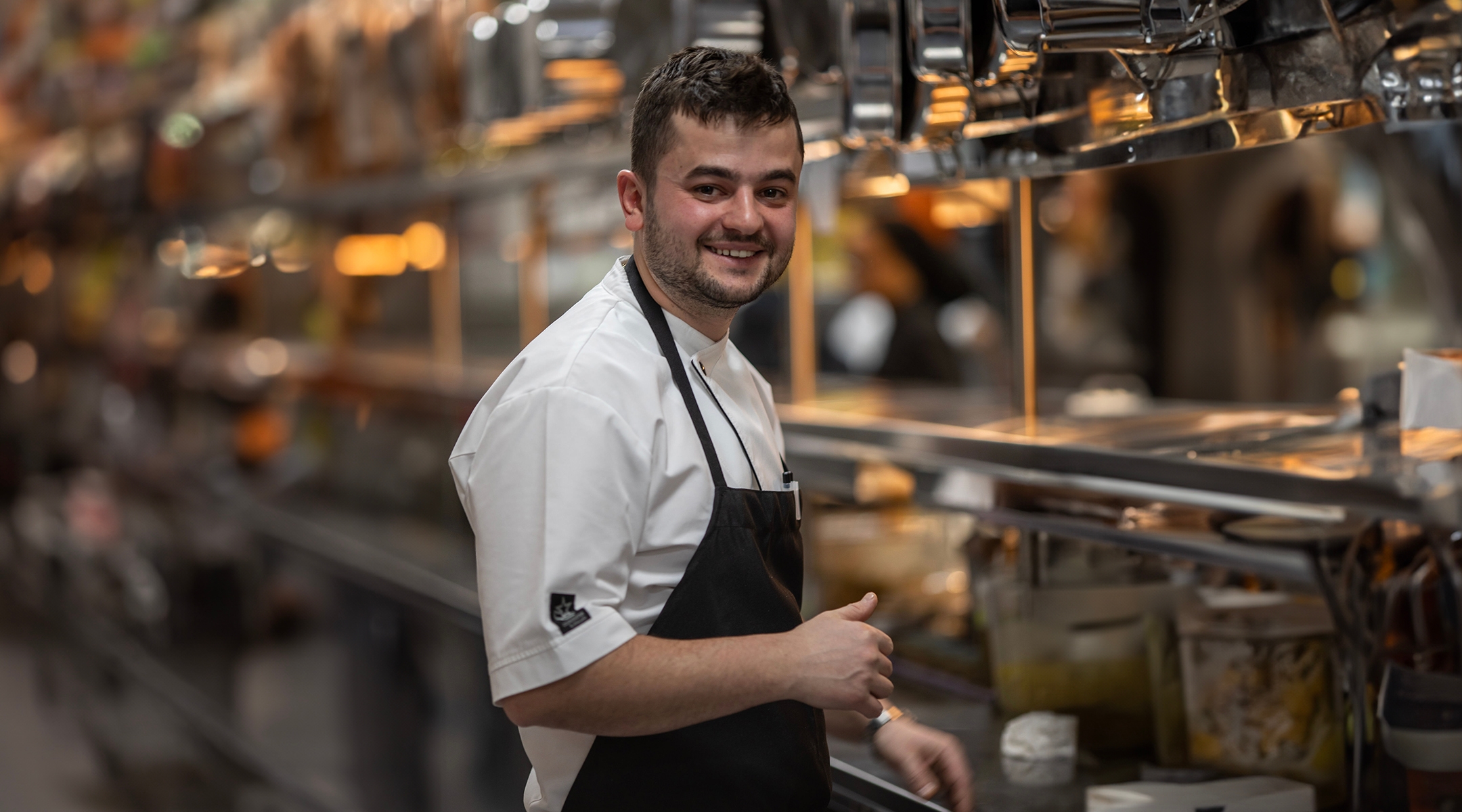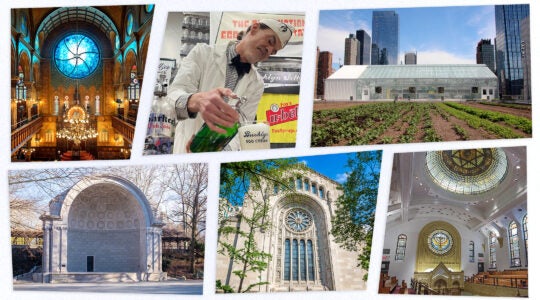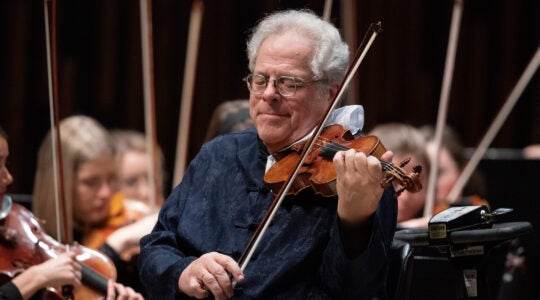Across New York City, on Friday nights, restaurants are dimming the lights and setting long communal tables. Instead of serving their regular à la carte menus, these eateries are dishing out challahs, dips, wine and something far more intangible: connection.
Shabbat dinners — once the province of synagogues and family homes — are taking hold in New York’s dining scene. These Friday night dinners aren’t organized by rabbis or Jewish nonprofits — rather, they’re hosted by Jewish chefs and restaurateurs themselves.
In the aftermath of Oct. 7 and amid a wave of Jewish longing for community, Shabbat dinners held at, and organized by, these restaurants are a new kind of Friday night experience. It’s a trend that’s similar to, but separate from, the sort of swanky, secular Shabbat dinner parties that are often hosted by influencers that have become a specific kind of New York City night out. Instead, these Shabbat gatherings resemble a more traditional restaurant visit that, at the same time, honors the day of rest.
Among the restaurants that are regularly hosting Shabbat dinners are Mesiba in Brooklyn, a lively eatery that aims to bring “Tel Aviv-style” meals to diners; Moabet, sister venue to Israeli destination Reunion; Reserve Cut, a high-end, glatt kosher steakhouse that offers prepaid dinners every Friday night for $245 per person, and Talia’s Steakhouse, a glatt kosher establishment that has been mounting prepaid experiences of the sort since it first opened on the Upper West Side in 2002.
Loel Muller, the culinary director for restaurateur Eyal Shani’s Malka locations across the U.S., has watched the trend evolve firsthand.
“There’s something about a Shabbat dinner that brings people together,” Muller said. “People are aching for camaraderie and community. Especially now, New York can be a lonely place, and everything feels scary, there’s comfort in sitting together and feeling like you’re at home — even if you’re not with your own family. For me, a Shabbat dinner is a safe space.”
While Malka’s kosher locations in New York close on Friday nights for Shabbat, sister restaurants like HaSalon and Port Sa’id have hosted Shabbat dinners, each one bringing together 30 to 40 guests for an intimate, festive meal cooked and served by the eatery’s staff. Attendees get to experience the restaurants’ renowned food, albeit in a different, more intimate and, perhaps, meaningful setting.
“We don’t do it for the money,” Muller revealed. “If we were to do it at Malka every Friday, yes, because the restaurant is closed on Friday nights. Is it smart for business? If I have an amazing event every week, sure. But it needs to be something special that speaks to people. We’re not getting richer when hosting these.”
For many restaurateurs, the draw of hosting a Shabbat dinner isn’t necessarily about revenue. Rather, it’s about resonance.
Einat Admony, chef and owner of Balaboosta, has begun offering what she calls Kabbalat Shabbat dinners in the private dining room of her Greenwich Village restaurant before official service kicks off. They’re short and sweet, about two hours long, allowing her to still open the restaurant to regular service later in the evening.
“People love it,” she said. “They love the food and the Moroccan music. I love these events because of the connections that people make. When you go to a restaurant with your girlfriend or a friend, you just talk to each other. For me, it’s about making connections.”
Admony’s Shabbat dinners include candle blessings, but the chef and owner is quick to note that the point isn’t to make anyone more observant — it’s to remind them that Jewish identity can be joyful, inclusive and shared.
“Especially now, people need it more than ever,” she said. “During the last Kabbalat Shabbat that I did, people came to me and thanked me for it.”
In Brooklyn, restaurateurs and married couple Inna and Eldad Mashiach saw the same need. After years of running Reunion, a popular Israeli restaurant in Williamsburg, they opened Moabet — an adjacent private event space that now hosts monthly Shabbat dinners that are ticketed and publicized via word of mouth and social media. (“Moabet” is a Ladino word meaning an intimate, loving conversation.) They started with the idea that maybe families or Israelis would come, but were surprised to find that the majority of attendees were young Jewish professionals, many of them single, looking for a meaningful way to spend Friday night.
“We saw a lot of these types of dinners pop up and said, we can do the same,” Inna Mashiach said. “We said let’s try it and see who is going to come.”
Mashiach noted that while her space has occasionally hosted Shabbat collaborations with social media influencers and organized groups like Shabbat Club, the team at Moabet also puts on their own ticketed Shabbat dinners featuring dishes prepared at Reunion. When hosting these dinners independently, the couple retains all profits from ticket sales and has full creative control over the evening’s format and menu.
Mashiach suggests that after Oct. 7, some diners are craving settings that feel safe and supportive.
“A lot of the guests that come have found that they are no longer friends with some people they used to have in their lives,” Mashiach said. “It’s just my assumption but I think that, sometimes, people prefer to stay within their community. Because of the war, it became more of a need.”
For attendees like Perry Korinne, a 33-year-old Manhattanite who has been a steady presence at Shabbat Club dinners in various restaurants plus organized meals at Chabad, the events offer a welcome alternative to religious spaces that can feel too formal or bars that feel too impersonal.
Korinne always found Chabad-sponsored dinners to be a bit above her religious level and those organized by non-kosher restaurants and clubs a bit below it.
“Before Oct. 7, Shabbat events were mostly attended by people who were more religious or very involved in Judaism,” she said. “It wasn’t a very secular crowd.”
Now, she said, “so many people care more” about their Jewish identity, so the happenings have taken a turn and become broader events. “I think it’s incredible because it brings people of all religious levels together,” she said.
She noted the meals can be pricey — tickets can run over $100 — but it’s comparable to any night out in New York.
“At least here, you know you’re going to meet people who share something with you. It’s better than staying home,” she said.
By contrast, at Talia’s Steakhouse — which has been hosting kosher and prepaid Shabbat dinners for 23 years — the fallout from Oct. 7 has actually led to a decline in attendance at the weekly event.
“I think less people come now because they don’t want to be seen in kosher establishments and be exposed, especially if sitting outdoors,” said Ephraim Nagar, the restaurant’s owner, referring to the rise in antisemitic crimes reported across New York after Oct. 7.
Still, the shift hasn’t deterred Nagar, who continues to see strong interest from certain kinds of diners.
“A lot of professionals who don’t have time to cook come every week,” he said of the restaurant’s Friday night crowd. “Also people from Israel, France, Canada and just out of state who want to have a kosher meal on Shabbat.”
Though motivations clearly vary — from creating community to activating an underused space to simply sharing a meal the way it’s done in Tel Aviv or Jerusalem — each restaurateur echoes the same sentiment: Shabbat dinners out are more than just a fad. They are filling a void that’s part spiritual, part emotional and part social. They offer a kind of nourishment that goes beyond food — an invitation to belong, to connect, to slow down.
For Muller, it’s about building bridges.
“If you are able to build a community of religious and secular people together, you hit the jackpot,” he said. “With everything that has happened since Oct. 7, if we can become stronger because of it and more open to the other side as Jewish people, it’s a good thing.”
Admony agrees. Whether or not they’re a long-term business model, they’re exactly what’s needed at this moment.
“Doing Kabbalat Shabbat is something that I was talking about for 17 years,” she said. “[Now] it makes more sense than anything. I see the reaction of people when they come and sign up for the next one.”
The New York Jewish Week brings you the stories behind the headlines, keeping you connected to Jewish life in New York. Help sustain the reporting you trust by donating today.





